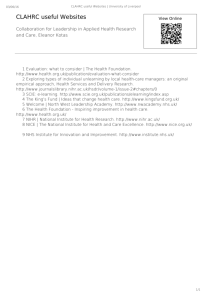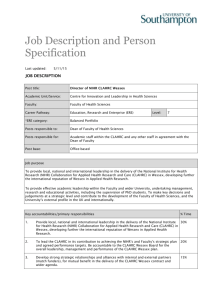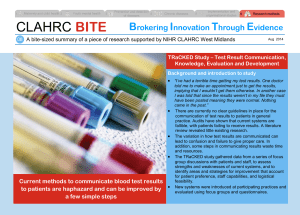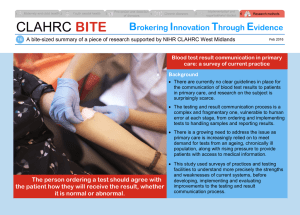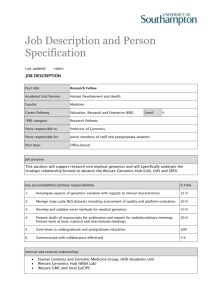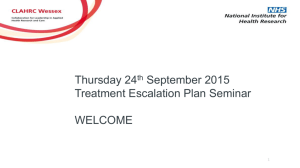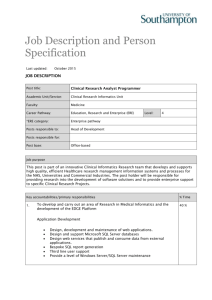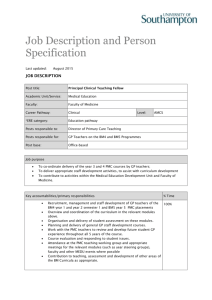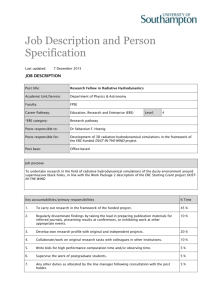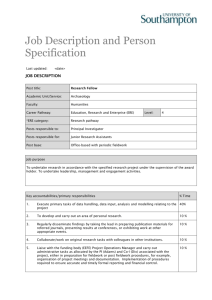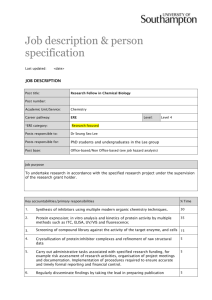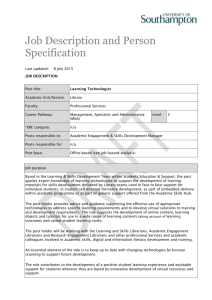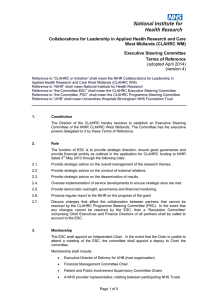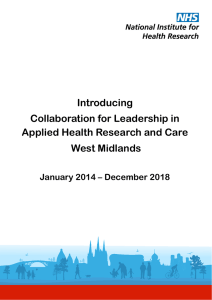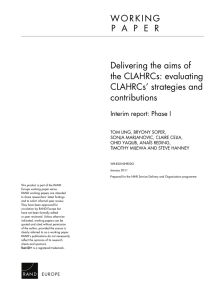Job Description and Person Specification
advertisement
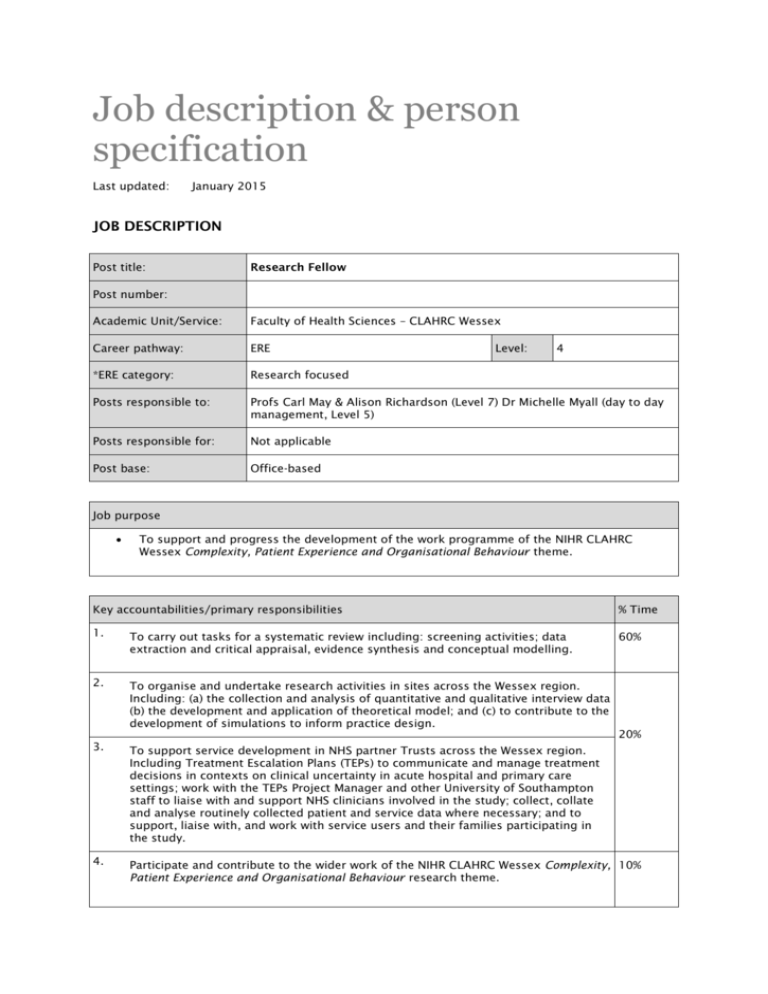
Job description & person specification Last updated: January 2015 JOB DESCRIPTION Post title: Research Fellow Post number: Academic Unit/Service: Faculty of Health Sciences – CLAHRC Wessex Career pathway: ERE *ERE category: Research focused Posts responsible to: Profs Carl May & Alison Richardson (Level 7) Dr Michelle Myall (day to day management, Level 5) Posts responsible for: Not applicable Post base: Office-based Level: 4 Job purpose To support and progress the development of the work programme of the NIHR CLAHRC Wessex Complexity, Patient Experience and Organisational Behaviour theme. Key accountabilities/primary responsibilities % Time 1. To carry out tasks for a systematic review including: screening activities; data extraction and critical appraisal, evidence synthesis and conceptual modelling. 60% 2. To organise and undertake research activities in sites across the Wessex region. Including: (a) the collection and analysis of quantitative and qualitative interview data (b) the development and application of theoretical model; and (c) to contribute to the development of simulations to inform practice design. 3. To support service development in NHS partner Trusts across the Wessex region. Including Treatment Escalation Plans (TEPs) to communicate and manage treatment decisions in contexts on clinical uncertainty in acute hospital and primary care settings; work with the TEPs Project Manager and other University of Southampton staff to liaise with and support NHS clinicians involved in the study; collect, collate and analyse routinely collected patient and service data where necessary; and to support, liaise with, and work with service users and their families participating in the study. 4. Participate and contribute to the wider work of the NIHR CLAHRC Wessex Complexity, 10% Patient Experience and Organisational Behaviour research theme. 20% Key accountabilities/primary responsibilities % Time 5. Assist with the organisation of seminars and meetings, and contributing to dissemination of findings, preparing reports/papers for publications, presenting results at conferences and meetings, or exhibiting work at other appropriate events. 6. To undertake administrative tasks associated with research activity including, but not 5% limited to: (a) drafting internal reports, record keeping, data management, organization of meetings. (b) implementing relevant statutory, university and NHS procedures including, but not limited to those related to Data Security and Management, Good Clinical Practice, Patient procedures required to ensure protection of confidential patient and other data and documents 7. Any other duties as allocated by the line manager following consultation with the post holder and to work on any CLAHRC project as requested by the COO, Research Director or Director of the CLAHRC.” 5% Internal and external relationships (including nature and purpose of relationships) Internal: Close working with the Complexity Theme Leads, team members, and CLAHRC Wessex Methodological Hub. Liaise with other CLAHRC Wessex staff including Central Team staff. External: NHS Trust staff; PPI representatives. Special Requirements To be available to participate in fieldwork as required by the specified research project. To attend national and international conferences for the purpose of disseminating research results. Applications for Research Fellow positions will be considered from candidates who are working towards or nearing completion of a relevant PhD qualification. The title of Research Fellow will be applied upon successful completion of the PhD. Prior to the qualification being awarded the title of Senior Research Assistant will be given. PERSON SPECIFICATION Criteria Essential Desirable Qualifications, knowledge & experience (For application at Research Fellow level) PhD in a social science or cognate health sciences discipline. Research experience related to health psychology, medical sociology, health services research. (For application at Senior Research Assistant level) Postgraduate qualification in a social science or cognate health sciences discipline. Evidence of rigorous research training and strong research skills. Evidence of professional development relative to opportunity. Experience of collection and analysis of quantitative and qualitative data (literature review Experience of content analytic research techniques. How to be assessed Application, Interview & references and fieldwork). Experience of NHS Ethics and research governance processes. Planning & organising Able to organise own research activities to a high quality standard and to deadlines. Problem solving & initiative Able to develop understanding of Experience of research with health complex problems and apply inprofessionals, patients and service depth knowledge to address them. users in healthcare settings. Management & teamwork Able to contribute to management Experience of working in and administrative processes. multidisciplinary research settings. Work effectively in a team, understanding the strengths and weaknesses of others to help team work development. Communicating & influencing Communicate new and complex Experience of working across information effectively, both verbal professional boundaries. and in writing, engaging the interest and enthusiasm of the target audience. Able to present research results at group meetings and conferences. Evidence of presentation at local meetings, national and international conferences. Able to write up research results for publication in leading peerviewed journals. Evidence of successful writing for publication. Able to communicate with a variety of stakeholders and adapt style to meet the needs of the audience. Other skills & behaviours Application of relevant Health and Safety regulations within work area. Positive attitude to colleagues. Keep up to date with relevant research literature and regularly update research skills. Special requirements Able to travel to undertake field work, attend meetings, and to attend national and international meetings. Understand and perform legally and organisationally mandated procedures to ensure the security and confidentiality of research data. Current Good Clinical Practice Training (completed in the last 2 years). JOB HAZARD ANALYSIS OFFICE-BASED POST If this post is an office-based job with routine office hazards (eg: use of VDU) no further information needs to be supplied. √ NON-OFFICE BASED POST If this post has some hazards other than routine office (eg: more than use of VDU) please complete the analysis below. ## - HR will send a full PEHQ to all applicants for this position. ENVIRONMENTAL EXPOSURES Outside work Extremes of temperature (eg: fridge/ furnace) ## Potential for exposure to body fluids ## Noise (greater than 80 dba - 8 hrs twa) ## Exposure to hazardous substances (eg: solvents, liquids, dust, fumes, biohazards). Specify below: Frequent hand washing Ionising radiation EQUIPMENT/TOOLS/MACHINES USED ## Food handling ## Driving university vehicles(eg: car/van/LGV/PCV) ## Use of latex gloves (prohibited unless specific clinical necessity) ## Vibrating tools (eg: strimmers, hammer drill, lawnmowers) PHYSICAL ABILITIES Load manual handling Repetitive crouching/kneeling/stooping Repetitive pulling/pushing Repetitive lifting Standing for prolonged periods Repetitive climbing (ie: steps, stools, ladders, stairs) Fine motor grips (eg: pipetting) Gross motor grips Repetitive reaching below shoulder height Repetitive reaching at shoulder height Repetitive reaching above shoulder height PSYCHOSOCIAL ISSUES Face to face contact with public Lone working ## Shift work/night work/on call duties Occasionally Frequently Constantly (<30% of time) (30-60% of time) (> 60% of time)
